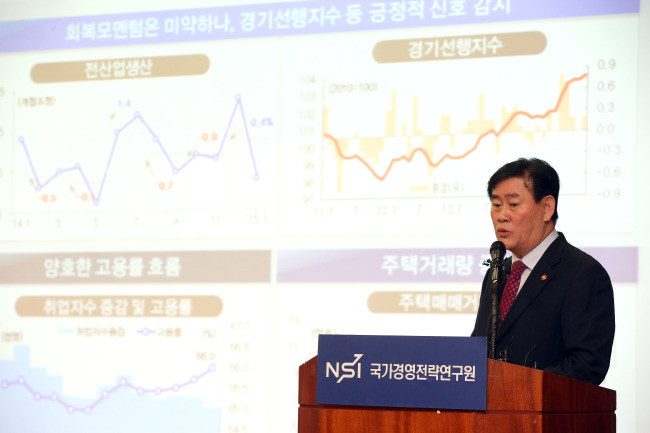South Korea’s Deputy Prime Minister and Finance Minister Choi Kyung-hwan on Wednesday expressed concerns about deflation and high youth unemployment.
In an economic policy conference in Seoul on Wednesday, the country’s top fiscal policymaker said that although Korea’s inflation had not turned negative, concerns were mounting due to a continuing drop in consumer prices increase.
When excluding an increase in cigarette prices, Korea’s consumer price growth has moved into negative territory.
“We are concerned about deflation due to the prolonged decline in consumer prices,” Choi said.
 |
Choi Kyung-hwan. (Yonhap) |
The consumer price growth has remained below 1 percent since October 2013. In February this year, consumer prices grew 0.5 percent on-year, marking the slowest growth in 16 years, according to Statistics Korea on Tuesday.
Decreasing prices of goods and services would be beneficial to the lower and middle class. But it would further aggravate private spending, thus sapping private investment and creating a vicious circle that could weigh on the country’s economic growth.
“We must be aware that low consumer prices will wither sentiment,” Choi said.
The finance minister’s concerns were in stark contrast to positions taken by President Park Geun-hye and Bank of Korea Gov. Lee Ju-yeol, who downplayed deflation concerns early this year.
Like in the U.S. and Japan, Korea’s private sector must move to raise wages for employees in order to revive domestic consumption, he said.
“Domestic consumption will be unable to revive unless we see an increase in wages,” Choi said at the forum.
Although signs showed that Korea’s economy was improving slightly, with the employment rate surpassing 65 percent for the first time, Choi said the economy had been moving sideways ― neither going up nor down ― over the last five to six years.
To make matters worse, youth employment, in particular, was showing no signs of improvement, he added, noting that the youth jobless rate stood at 9.2 percent in January.
“We are facing a serious problem in youth unemployment,” the deputy prime minister said.
“The fundamental problem of our economy can be found in the labor market.”
He stressed it would be necessary to pursue structural reforms in the labor market with the aim of achieving a balance between job security and flexibility.
Choi added that Asia’s fourth-largest economy faced external variables amid growing economic uncertainties over Europe, China and Japan. Also, the U.S. Federal Reserve’s interest rate rise in the near future would likely affect the global economy, he said.
By Park Hyong-ki (
hkp@heraldcorp.com)





![[Exclusive] Hyundai Mobis eyes closer ties with BYD](http://res.heraldm.com/phpwas/restmb_idxmake.php?idx=644&simg=/content/image/2024/11/25/20241125050044_0.jpg)
![[Herald Review] 'Gangnam B-Side' combines social realism with masterful suspense, performance](http://res.heraldm.com/phpwas/restmb_idxmake.php?idx=644&simg=/content/image/2024/11/25/20241125050072_0.jpg)

